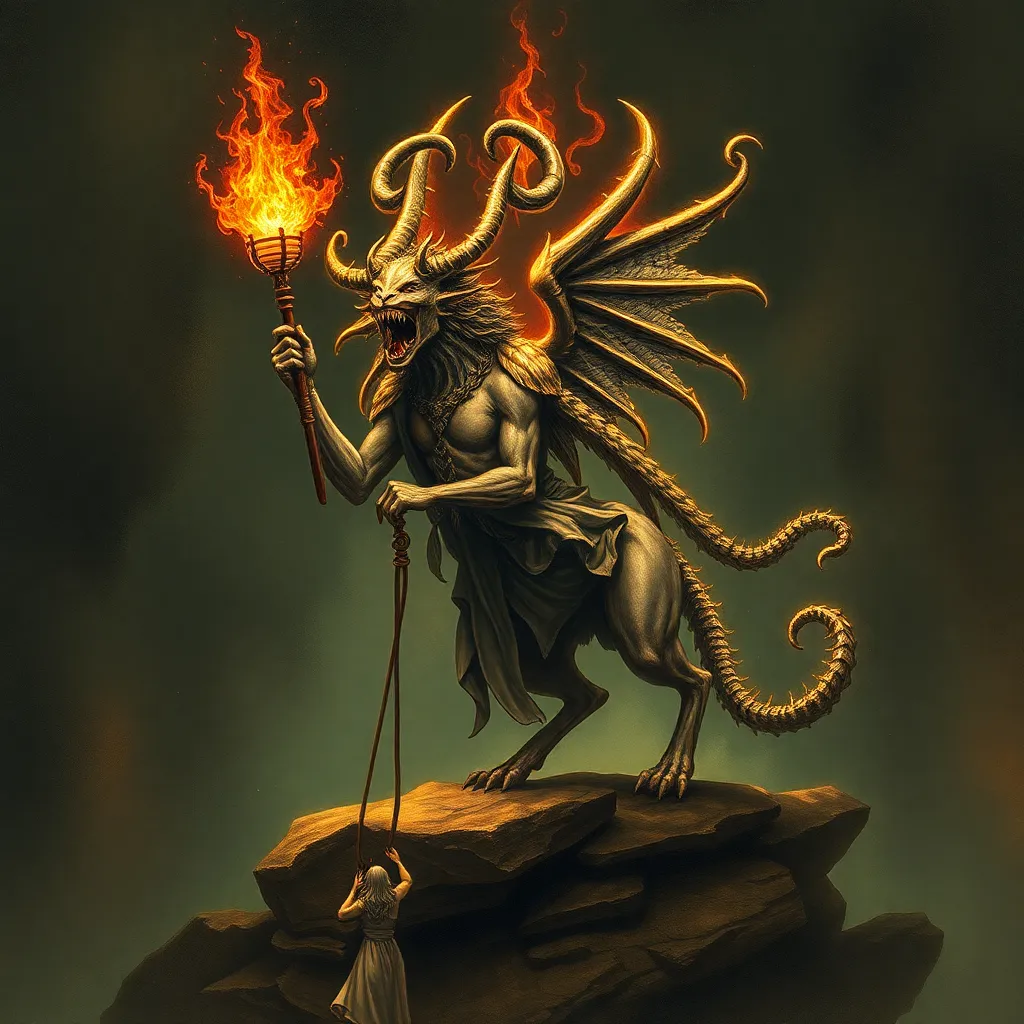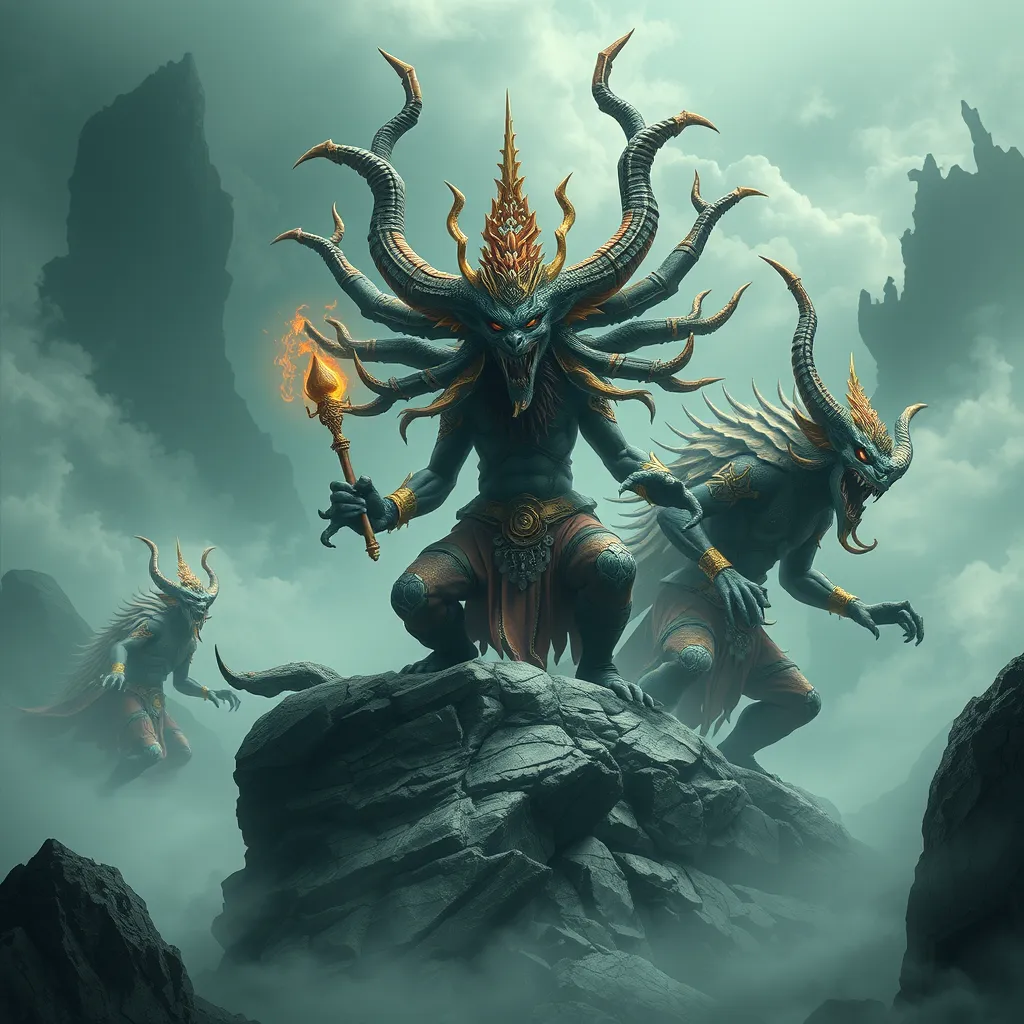Empusa’s Guile: Tales of the One-Hoofed Demon in Ancient Greece
I. Introduction
In the rich tapestry of Greek mythology, few figures are as enigmatic and captivating as Empusa. This one-hoofed demon, often associated with seduction and deception, represents the darker aspects of the ancient Greek psyche. As a creature rooted in folklore, Empusa embodies both fear and fascination, making her a significant figure in ancient narratives.
The significance of one-hoofed demons like Empusa is profound, reflecting ancient societies’ views on morality, temptation, and the supernatural. This article aims to explore the origins, characteristics, and cultural impact of Empusa, shedding light on her role in ancient Greek mythology and her lasting influence on modern interpretations.
II. The Origins of Empusa
The name “Empusa” derives from the Greek word “empousa,” which translates to “one who has a foot that is a hoof.” This etymology not only describes her physical form but also situates her within a broader cultural context of demons and spirits in ancient Greece.
Empusa is closely linked to Hecate, the goddess of magic and witchcraft, who presides over the underworld. This connection emphasizes Empusa’s role as a being that straddles the line between the living world and the realm of the dead, further enhancing her mystique.
Early literary references to Empusa can be found in works such as Aristophanes’ “Frogs” and “The Satyricon” by Petronius, where she is depicted in various contexts, showcasing her multifaceted nature. These portrayals laid the groundwork for her characterization as a seductress and a harbinger of doom.
III. The Physical Description of Empusa
Empusa’s most striking characteristic is her one-hoofed appearance, which sets her apart from other mythological beings. This physical trait is not merely a curiosity; it symbolizes her otherness and her ties to the supernatural.
In addition to her one-hoofed form, Empusa is known for her shape-shifting abilities, allowing her to take on various forms to deceive and seduce her victims. This adaptability makes her a formidable presence in folklore and myth, as she can appear as a beautiful woman or a terrifying monster, depending on her intentions.
The symbolism of Empusa’s appearance is rich in meaning. Her dual nature as both alluring and fearsome reflects the complexities of desire and danger, serving as a reminder of the thin line between attraction and peril in human relationships.
IV. Empusa in Folktales and Legends
Empusa features prominently in numerous folktales and legends, often serving as a warning against the dangers of temptation. One notable story involves a young man who falls for her seductive charms, only to discover too late that he has become her prey. This cautionary tale underscores the risks associated with succumbing to desire.
In broader folklore, Empusa’s role extends beyond mere seduction; she embodies the consequences of unchecked passions and desires. Tales of her exploits often serve as moral lessons, cautioning individuals about the dangers of succumbing to temptation.
- Empusa as a cautionary figure in local folklore.
- Her influence on storytelling traditions throughout ancient Greece.
- Variations of her tales across different regions.
V. Empusa’s Role as a Seductress
Empusa is often depicted as a temptress, using her charm and allure to ensnare her victims. This characterization highlights themes of seduction and deception that permeate her narratives, making her a complex figure in mythology.
The themes of seduction associated with Empusa reflect ancient societal views on female sexuality and power. Her ability to manipulate and deceive speaks to the fears and anxieties surrounding women who defy traditional roles, positioning Empusa as both a threat and an object of fascination.
Psychologically, Empusa’s character can be seen as a manifestation of the duality of human nature, representing both the allure of desire and the dangers that accompany it. Her stories encourage a reflection on the choices individuals make when faced with temptation.
VI. Theological Interpretations of Empusa
Within the pantheon of Greek demons, Empusa occupies a unique position. She is often compared to other mythological figures such as Lamia and the Striges, both of whom share similar qualities of seduction and danger. These comparisons reveal the common themes present in the narratives surrounding female demons in Greek mythology.
Empusa’s actions, particularly her seduction of men, raise important moral and ethical questions. Ancient texts often explore the implications of her behavior, prompting discussions about virtue, temptation, and the consequences of succumbing to base desires.
- Empusa’s place among other mythological figures.
- The moral lessons derived from her narratives.
- Comparative analysis of her character with Lamia and Striges.
VII. Legacy and Influence in Modern Culture
Empusa’s legacy extends into contemporary literature and media, where she continues to captivate audiences. Modern adaptations often reimagine her character, exploring themes of empowerment and agency in new ways.
The fascination with one-hoofed demons persists, reflecting humanity’s ongoing interest in the supernatural and the complexities of human desire. Empusa’s stories resonate with modern audiences, offering insights into the timeless struggle between attraction and danger.
In literature, films, and art, Empusa serves as a symbol of the darker aspects of femininity, challenging traditional portrayals and inviting reevaluation of ancient beliefs in contemporary contexts.
VIII. Conclusion
Empusa’s significance in ancient Greece cannot be overstated. As a one-hoofed demon who embodies both seduction and peril, she serves as a powerful reminder of the complexities of desire and morality. Her tales continue to resonate, providing insights into human nature and the timeless struggle against temptation.
The enduring allure of Empusa’s stories speaks to the universal themes of attraction, deception, and consequence, ensuring her place in the pantheon of mythological figures. As we reflect on her legacy, it becomes clear that Empusa remains a captivating symbol of the interplay between the human experience and the supernatural.



